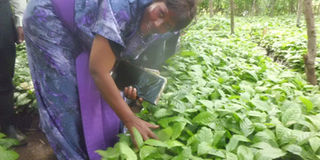Luweero farmer has found her livelihood in coffee seedlings

Betty Nankya shows some of the nursery seedlings which she sells. PHOTO BY LOMINDA AFEDRARU
What you need to know:
A model farmer in Luweero who abandoned a business enterprise in Kampala and switched to running a coffee seedling nursery is enjoying the move. She shares her story
A model farmer in Luweero who abandoned a business enterprise in Kampala and switched to running a coffee seedling nursery is enjoying the move. She shares her story.
“My name is Betty Ndugga Nankya. I am 55 years old, a widow and I live with my family in Matugga. My children are all grown and they finished their studies, they are living on their own with their families and I appreciate their effort in paying labourers on the farm.
I switched to coffee in 2012 after the family business of selling clothes at Kalerwe market stalled. The owner of the plot on which we put a structure wanted to sell his land but because he did not give us any grace period, he ended up destroying our stall.
Secondly I had attended a number of trainings in coffee nursery operations organised by agricultural experts from Hanns. R. Neumann Stiftung partly funded by Food and Agricultural Organisation (FAO) which inspired me.
I started with 50 coffee seedlings and began expanding in the next season to 10,000 seedlings and I currently have 220,000 seedlings which are ready for marketing.
What is done
I run this business, on part of a 10-acre piece of land which belongs to my late father at Luwobe Kazinga Village in Luweero District.
The first seedlings I got from the team which trained us. The seedlings are of Robusta coffee from National Agricultural Research Laboratories (NaRL) in Kiwanda, mainly grown by farmers in Luweero District.
In consequent multiplication of seedlings, I either grow them directly from the coffee seed. But I prefer breeding them by cloning from my mother garden. This is because they tend to be clean, tolerant to pests and diseases although the variety bred directly from the seed has strong roots compared to the cloned one.
Uganda Coffee Development Authority (UCDA) is the major coffee seedling buyer in Luwero but the challenge is the mode of payment, it takes a year to process.
To supplement this income, I sell to local farmers at a cost of between Shs300 and Shs500 depending on the period and variety. However, this is on a small scale.
In my calculations, I could earn about Shs660m that is if UCDA takes all the plantlets. Even then, half of this money is spent on inputs such as pesticides, polythene bags for growing the seedlings, water for irrigation as well as labour among others.
On average, I have about 11 labourers, eight of them are usually working in the nursery beds filling the polythene bags with soil. I pay each filled bag Shs500 and the rest are young boys who help me fetch water and each jerrican is Shs200. On average, I use 20 drums of water for spraying the nursery bed daily, but in the rain season it may be less.
Challenges
One of the major challenges I am faced with is getting water from the community borehole and so I use these boys to fetch for me from a well which is about one kilometre away. On average, I spend Shs100,000 in paying those fetching water.
When experts from the partner organisations visited last year, they gave me three drums for keeping water, two spades and fish net which I used in a section of the nursery bed for regulation of the sunlight.
FAO representatives in Kampala promised to drill a borehole on my farm which they say will cost about Shs10m.
I am also have the challenge of pests such as the black coffee twig borer and other insects though it is not so serious but I usually seek advice from experts at Hanns. R. Neumman.
It is important to observe good agronomy practices like spacing, frequent watering, balancing of the sun rays by covering with appropriate material, and spraying.
It takes about four to seven months from date of planting for the seedlings to be ready for purchase, depending on the variety.”
Expert take
What my team does is solicit for financial support from various development partners, and we sensitise farmers and nursery seed operators on the best practices of growing coffee and breeding the seedlings.
In as far as the agronomy practices are concerned, I usually advise farmers to use Thionex pylinex insecticide for spraying pests such as leaf minors, seed links and coffee fungal diseases like coffee blight, dumping off and coffee wilt.
Other recommended Fungicides are, Nordox cooper fungicide and carbendazim. We encourage them to join farmer field schools.
Kennedy Sennoga, field coordinator, Hanns R.Neuman Stiftung




